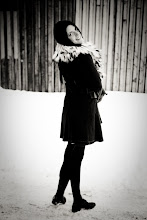life-questions as any disillusioned alum: "If we're all going to die the moment we graduate, isn't it what we do before that counts?"
An Education: Lone Scherfig.

I sound just as campy as James Lipton right now, but I actually was profoundly impressed by the subject matter of the
film. Not since All I Wanna Do with the masterful Lynn Redgrave, R.I.P. (who, I'm proud to say, played opposite my
sister Alyssa in their roles as Queen Elizabeth I and new world-bound Eleanor Dare, respectively, at Waterside
Theater's annual production of The Lost Colony in North Carolina, but I digress...) have I seen a film that so deftly
tackled the second wave-feminist ideals of teenage girls in the 60s, with a minimal but appropriate sense of humor--ya
know, the whole "I'm so wise beyond my 17.5 years and super witty too" kind of skepticism toward sex, family, gender
roles, career goals, and (you guessed it) female higher education. I watched the 'making of' segment, and one of the
producers mentioned the film's relational capabilities toward its audience. Who better to relate to protagonist Jenny's
English literature devoted, French language/culture loving character than myself?
Basic plot: 16 year old academic ingenue Jenny, played by 25 year old Carrie Mulligan, falls in love with a creepy Peter
Sarsgaard after his character David hits on her from his maroon sports car while she's standing in the rain. The film
never delves much into his character, despite what one of the producers described as "a multi-layered man," and Carrie
did a good acting job I guess, but mostly because she played herself: a well-educated 25 year old, not a doe-eyed teen.
He wines and dines her classical music and art fetish with orchestral concerts and pre-Raphaelite painting auctions
and eventually takes her to Paris for a silent, slightly cheesy montage of every scenic area in the city. Needless to say,
Jenny must inevitably choose (though I'm not exactly sure why) if she wants to marry him or finish her high school
education (presumably because second wave feminism ordained that a girl could not have both [??]).
The film's depiction of 60s rural England is magic, and the costumes made me really want to take on the Mad Men
phenomenon. I mean, just take a look at the still above, and you can see that the cinematography is like the oil painting
Jenny adores. I will say that the whole Lolita storyline is a bit over done, but I enjoyed the nervous-turned-sure
dynamic of Jenny's feelings toward David. Better yet was the film's analysis of critical aestheticism/liberal arts and
their non-existent use in post-grad society.
My dilemma exactly.
Here's my favorite exchange between Jenny and her headmistress (except this woman had nowhere near the same
impact as Lynn Redgrave in her similar role):
"It's not enough to educate us anymore, Miss Walters. You've got to tell us why you're doing it."
(Long, unsure pause.)
"It doesn't have to be teaching, you know. There's a civil service."
(Another long pause, apparently not pleased with this answer.)
"I don't wish to be impertinent, Miss Walters, but it is an argument worth rehearsing. You never know, someone else
might want to know the point of it all one day."
And why was this my favorite dialogue of the movie?? Because whenever anyone asks me what I want to do with an
English degree they'll cut in with, "Teach??" before I even have the chance to answer the question. I certainly do not
wish to diminish anyone's teaching aspirations, but I do firmly believe that one should have a passion for it. And I
know I'm not one of those people. So that leaves me wondering if my love for literature and film is wasted if not
imposed on the minds of the young in a classroom. I certainly hope not.
It's funny; I feel that the film's ending leaves the "what to do with an English degree" question somewhat unanswered,
and where Jenny may have come up with a good counter to her headmistress, she pretty much backpedals into Miss
Walters' strict coherence with second wave feminist ideals: men and relationships are bad, free-thinking and Charlotte Bronte cure all.
Thus, I'm not a huge fan of the film's boxy ending, but for the most part it stuck to a rounded interpretation of the
age-old "loss of innocence" and the even older theme of emotional redemption: you've gotta go through hell and back
to find yourself, and even then the image gets fragmented.
If nothing else, I liked coming away pretending that the similar interests Jenny and I shared merited someday being
given this same compliment:
"The thing is Jenny, you know...without necessarily being able to explain why. See, you have taste. That's not half the
battle, that's the whole war."
Feel free to imagine that your personal aesthetics deserve winning the whole war, too. In the meantime, I'm going to
assume that flipping burgers for the rest of my life will at least be enhanced by recognizing the aesthetic aspects of the
golden arches in comparison to Hawthorne's scarlet letter.
;]







No comments:
Post a Comment